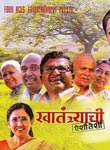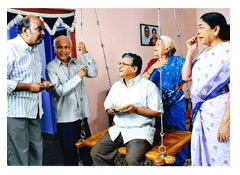‘Swatantryachi Aisi Taishi’ – a lesson to learn
|
Rating: 2/5
Presenter: Four aces productions Producers: Dr. Nandkumar Tasgavkar, Mrs. Vandana Nandkumar Taasgaonkar Story, Director: Ramesh More Camera : Aniket Khandagale Cast: Arun Nalawade, Sulabha Deshpande, Amita Khopkar, Uday Sabnis, Jayant Sawarkar, Avinash Narkar, Aishwarya Narkar, Sushant Shelar, Shailesh Datar Movie Review by: Sandeep |
Ramesh More‘s latest Marathi film ‘Swatantryachi Aisi Taishi’ talks about the present generation gap between children and parents. Mr. Jadhav (Arun Nalavde) wants to perform the ‘shradha’ ceremony of his late wife (Amita Khopkar) . But his four well settled children, the first one -a corporator (Avinash Narkar), second – an NRI (Shailesh Datar), third one- a doctor(Sushant Shelar) and the fourth son – a C.A, make a mockery of this ceremony.
The ‘shradha’ to be performed in the village thus turns into a circus, as the children try to project it as a ‘five star event” and make their trip into a picnic. The children are callous enough to return back home, even before their mother’s ‘shradha’.
Mr. Jadhav is agonized . His only support system are his two good friends – Uday Sabnis and Jayant Savarkar, who too are victims of their children’s apathy. Finally, the ‘Shradha’ is complete, after Jadhav pleads for his wife’s soul to free and attain ‘mukti’.
The film discusses in detail the lack of emotions and cultural values in today’s generation, due to the effect of globalization and recession. And above all, highlights the most important money factor, which has turned today’s children into money making machines, not finding time for their
parents. Parents also rue the fact for having given too much of freedom to their children and having failed to instill discipline in them
The film is a worth watch only because of the performances of Mr. Nalawde, Mr. Sabnis and Mr. Savarkar. Jyoti Subhash and Sulabha Deshpande lend good support. Avinash Narkar is impressive. Aishwarya Narkar is good in a guest appearance. The music by Ashok Patki is tuneful. The cinematography by Aniket Khandagle is lighted up well, by using different filters to show the village and city landscapes. The editor Vasant Kubal should have trimmed off the drinking session scenes, that has taken a long time. In all, the film can be watched only for it’s bearing on the subject presentation and deft direction .

